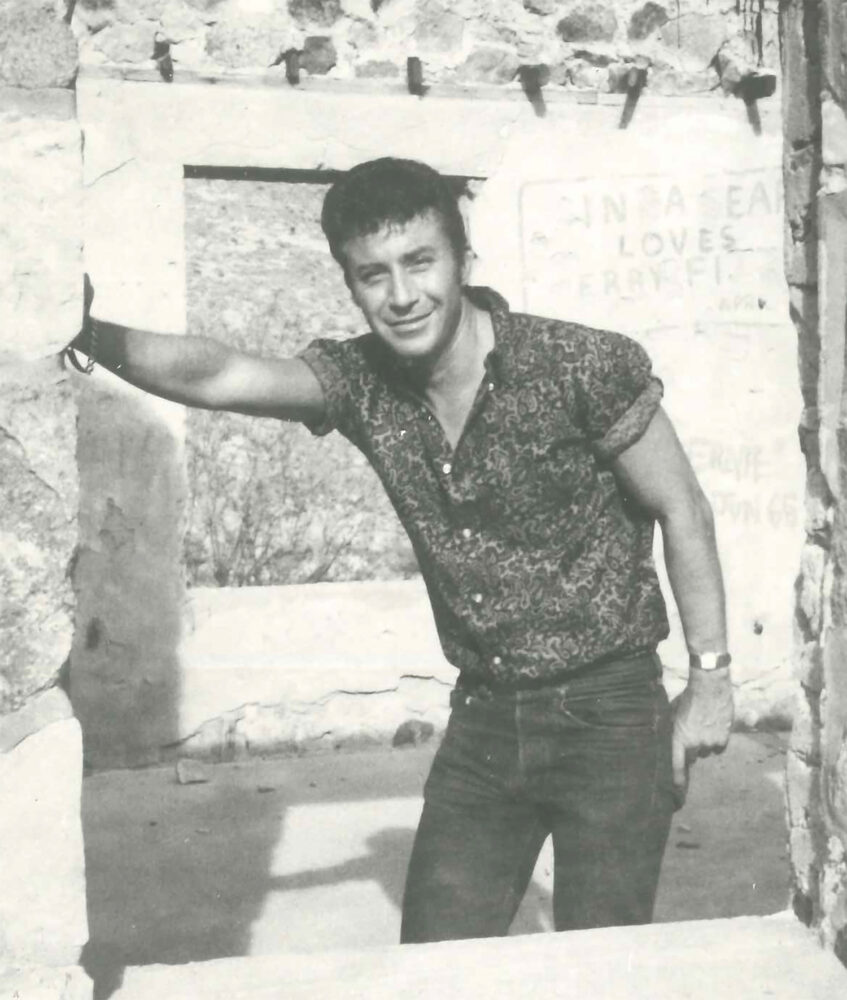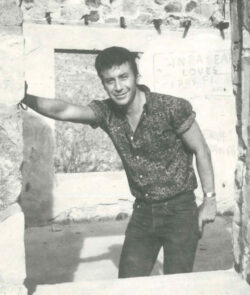Magazine
Wearing Masks 364 Days a Year
John Rechy's City of Night
Published: February 27, 2022
Last Updated: June 1, 2023

John Rechy Papers, the Wittliff Collections, Texas State University
Rechy in El Paso, 1967.
I missed Mardi Gras, madly, deeply, and endeavored to fill that king cake–sized hole in my soul with everything Carnivalesque, including the few novels that have tackled the holiday.
City of Night, by the Mexican-American author John Rechy, is not only the best Mardi Gras book ever written, but, in a just world, the 1963 novel would also be a contender in the Great American Novel debate. Alas, I suppose that Rechy’s salacious, four-hundred-page, semi-autobiographical debut, which traces the cross-country hustling of an unnamed gay sex-worker, is not exactly the stuff Pulitzer committees clamor after.
City of Night begins in El Paso, Rechy’s birthplace and, for his narrator, the city that “planted the seeds of the restlessness.” The narrator Greyhounds to New York City, landing in Times Square, “magnet for all the lonely exiles,” and finds shelter in the “soul-squashing” YMCA. At night, he hustles the neon-soaked streets for clients, men seeking fleeting trysts with what Rechy deems “youngmen.”
It’s unsavory work—work that Rechy performed before and after City of Night made him a literary darling. He writes of “malehungry looks hidden by the darkness of the night,” “the steady hint of violence,” the “smelly pornographic toilets” of “purgatorial subway tunnels.”
“Go Home and get Married,” his first trick advises, “that streetll swallow you so deep you wont know where you got sucked in, and it wont even throw you up like bad beer, itll digestya.”
One of the great triumphs of City of Night is how Rechy pushes well beyond Beat-era street slang to invent an entirely new vernacular, immersing readers in the language of the hustlescape. Contractions are de-apostrophized, nouns gain and lose capital letters, words are unconventionally smushed together—a literal linguistic queering. His streetpeople lurk in the loveshadows of the nightworld, making sexnoises while sexhuddling for sexmoney. This is the lowlife.
From New York, the novel’s narrator journeys to Los Angeles, where “the sun is too bright, too nakedly accusing.” He shelters in bars where patrons have one of two purposes: “to buy or to be bought.” Whether it’s “hoods, hobos, hustlers, [or] homosexuals,” Rechy writes, everyone is doing the same thing: “Hunting.” Selling sex to score pills and pot, the narrator wakes up in sheet-rumpled rooms, sticky movie house balconies, and cut-rate rent-a-rooms in hopeless Hope Street flophouses. “Theres this to consider,” he laments, “the world’s no f[…]ing good.”
Rechy gets at the great bleeding heart of New Orleans like few writers before or since.
Writing in the autofiction vein that is currently, a half-century-plus later, all the literary rage, Rechy’s narrator-self feels freshly, fleshily tangible, as do the novel’s other characters, each of whom had an “antecedent in ‘real life,’” according to the author. There’s a Proustian, bedridden professor who pays the narrator to listen to him ramblingly recount the memory of a former love-turned-torment; Chuck, a handsome Hollywood hustler in cowboy drag; and Neil, a fascist leather queen who seduces the narrator into performing horrific acts of violence.
The narrator’s picaresque run-ins become increasingly tenuous. He becomes disconnected from his body, with others, with himself. “People just disappear, in one way or another,” he observes. “You seldom know what really happened to anyone, except as your own life may have touched theirs.” Rechy’s words provide an uncanny prophecy of the coming crisis that will decimate the nation’s community of gay men a few short decades later.
The narrator follows the rush of youngmen to New Orleans, arriving just days before Mardi Gras. If New York was purgatory, and Los Angeles a sun-drenched simulacrum of paradise, Carnival season in New Orleans takes place where the roads to Sodom, Gomorrah, and Hell entwine. “An almost Biblical feeling of Doom,” Rechy writes of a ramble around the French Quarter, “of the city about to be destroyed, razed, toppled—assaults you.” Hustlers and hustler-seeking tourists “erupt as if hurled from a volcano igniting the streets.” The city becomes “the center of our desperate Today: a microcosmic arena of the electric nightworld Aware of the triumph of loneliness and death.”
The novel’s Mardi Gras scenes can be hard and heartbreaking to read, but Rechy gets at the great bleeding heart of New Orleans like few writers before or since.
Written on a rented typewriter, City of Night became an instant bestseller and, not surprisingly, a frequently banned book. New Orleans bookstores returned their copies to the publisher unshelved, though perhaps not unwanted by curious readers. By decade’s end, City of Night had engendered a generation of queer hustler literature and film (James Leo Herlihy’s Midnight Cowboy, Martin Scorsese’s Taxi Driver, Gus Van Zant’s My Own Private Idaho, and even Dennis Hopper’s lewd ode to Mardi Gras in Easy Rider), and likely inspired rock ’n’ roll’s hustler-god Jim Morrison to pen “L.A. Woman”—Are you a lucky little lady in the city of light? / Or just another lost angel? / City of night, city of night / City of night, city of night.
At the book’s end, as the Lenten season dawns, Rechy’s narrator opts not to bid farewell to the flesh. “People wear masks three hundred and sixty-four days a year,” a back-alley mystic tells him. “Mardi Gras, they wear their own faces.” Faced with the decision to renounce hustling for a chance at love, the narrator locates his true self, a man afflicted by loneliness yet unable to escape being crushed beneath the wheel that is the transactional and innately painful nature of desire and sex and love. He re-embraces the hustler life, and walks off into the vast and lonely “city of night of the soul.”
Rien Fertel recently won the Press Club of New Orleans’s Best Critical Review Award—for the second year in a row—for his essay “Godforsaken, Imbecilic, and Insane,” from the Winter 2020 issue of 64 Parishes.
